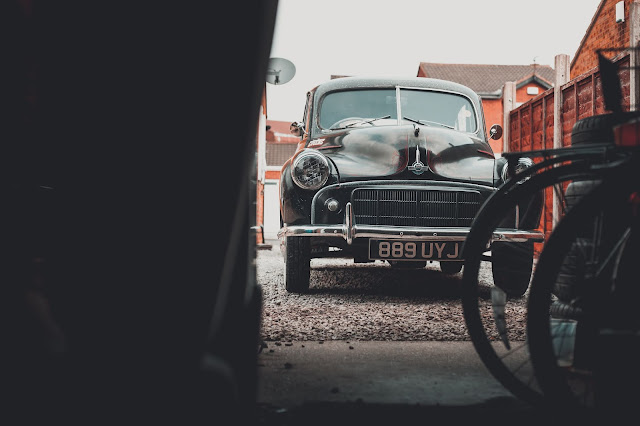Getting started as a Driveway Mechanic
If you're anything like me, you like to save a bit of money here and there, you don't mind a bit of graft and you've probably also got an interest in how things work - Or maybe you're just a nut who is obsessed with cars. Who am I to judge?
But if you really are anything like me, you've probably thought about fixing your own car once or twice in your life. But if you're anything like my past self, you'll probably also be cautious of what you'd be getting yourself into - Can I really do it? Is it expensive? Will I break something? Well the good news is that yes, you can do it - I'm a big believer that anybody can do anything, as long as they don't put up their own barriers.
I've been learning and fixing my own cars for a good few years now, from my very first time I forgot to attach an oil line to my A6's turbo back in Spain - That's when I figured out I need to LEARN before I tackle something. But here my most important tips and almost "rules of thumb" to help anybody get started with being a driveway mechanic.
Get some working space
I know the clue is very much in the title here, but the most important step is to firstly get yourself a place to work. Ideally, this area needs to be level and flat, so it's easy to work on and also easy to see anything that drops or drips. You also want to make sure it's a secure place that you won't lose possession of. Ideally, not a hired out self-storage unit, as they likely won't appreciate you working on a car on their property.
"..ultimately do it all comfortably."
I chose to use my driveway, which is ideal as it's obviously next to home, so I can pop in for a break or a coffee, talk to my partner, invite friends over and ultimately do it all comfortably. My driveway is actually graveled as opposed to asphalt, which actually makes it hard to see any nuts and bolts that drop, but if I have any small leaks, I can turn over the stones. However, that leads me to the point of make sure that you have the means of cleaning and managing the environmental impact of your work, too. This includes noise and potential "eyesores" for the neighbours. Talk to them, let them know and work with them so everybody is happy, then get yourself a gazebo or another form of cover so nobody has to look at it!
Get yourself a vehicle
Now there's a reason I said "vehicle" instead of car. Simply put, you don't want to run before you walk. You can, by all means get yourself a car and face the novice difficulties head on from the get-go, but that's precisely what I did and looking back, would never recommend. It cost me a lot of money, headaches and eventually, my Audi A6. I would always advise working on the patronisingly simply vehicles first - To quote the Navy, "if you can fix a skateboard, you can fix a bike. If you can fix a bike, you can fix an Apache Helicopter".
But let's say you want a car - Get yourself something old and simple. A renown classic car with a good aftermarket for parts and a community to talk to is ideal - Of course, the Morris Minor has just that! But some other examples would be old Volkswagens (Beetle, Golf, Polo), anything BMC (Austins are a good example), Minis, just to name a few. These are all mechanically driven cars with very little computer input, something that I mentioned in one of my previous posts.
"Get yourself something old and simple."
But the main takeaway from this point would be to NOT use your daily driver! Unless you definitely don't need to drive anywhere, leave that car to the proficient and professional until you get to a comfortable point. I was lucky that I have vintage mopeds, a bicycle and a good brisk walk to get to work, but if I needed a car and Eugene was under the knife, it put a lot of stress on my partner as she would always offer to chauffeur me places. You can lose a great deal of freedom if you break something on your daily driver, so save yourself a headache and buy a separate car to work on.
Get some basic tools
You thankfully don't need to splash out a lot for this bit. It's worth emphasising that you can do nearly every job with hand tools - You do NOT need to fork out on power tools until you absolutely must. To give you a good idea of the essentials, here's a small list of what's in my toolbox:
 |
| A basic socket and ratchet set |
 |
| A 2 Tonne trolley jack and jack stands |
 |
| A set of spanners 6mm - 23mm |
 |
| A set of screwdrivers (Flathead, phillips, torx and hex) |
 |
| Thick pliers and needle nose pliers |
Some jobs will require more specialist tools, but for the most part, you can undertake work with this selection. You'll see that I've opted to get cheaper tools for the simple fact that if it doesn't break, then it's good to keep using, but if it does break, then I've used it enough times to warrant spending more on getting a high quality tool! You'll always come across jobs which require a new tool too - Get it! You'll have the satisfaction of being able to lend it to others when you're done with it.
Learn as much as you can beforehand
It's a simple task really - Get a manual or do some research first. Popular cars have a lot of support and, usually, documentation. Classic cars often came with very in-depth manuals which outlined specifications and maintenance, whereas workshop manuals will contain information of more involved repairs. These are both always handy to have kicking out the garage.
"...you're not going to be the only person who's had this problem!"
But as well as manuals, find yourself a community or group of people who all know these cars - Social media and forums are a very good place to get technical help and to have any questions answered. Remember, you're not going to be the only person who's had this problem!
Some really helpful videos can be found on YouTube, usually for your specific vehicle, but failing that, channels like ChrisFix always help outline general repairs. It's also worth learning and understanding the underpinnings of car mechanics, such as how an engine actually works. Engineering Explained on YouTube has an excellent set of videos dedicated to this very purpose, among many other useful videos. The more you can learn about basic underpinnings, the better!
Get a partner or source of help
The last one, but one I would suggest you don't overlook, is to get somebody who can do this with you, be it there at the time or who can share their expertise.
I'd say that I'm lucky to have the support I have, but the fact is I wouldn't if I didn't seek it out. My cousin and partner are my go-to extra hands who are always keen to lend a hand - My partner, who started with no mechanical knowledge whatsoever, is actually able to relay to me how an engine works now, simply from helping me.
"You never know who is in your local area!"
I've also got the help of the aforementioned groups, forums and community/ I've been able to get this by joining the Morris Minor Owners Club and then get in contact with my local branch too. I've introduced myself on Facebook groups and the MMOC forums too. I've also met new people at odd moments - One funny memory I have was breaking down at the bottom of my village hill, at the exact same time another Morris Minor drove past! I hailed them and would you know it, it's an old friend I had previously spoken to in the past in a completely different place! We now stay in touch and he gives me as much advice as he can.
I also mentioned talking to your neighbours - You never know who is in your local area! Professionals at garages are sometimes also enthusiasts who can help you. Just remember, you're never short of help!
So that's it really. That's all that's needed to get started. From there, it's just a case of getting dirty and putting what you've learned into practice.
If you're looking to get started as a driveway mechanic or need any help, start with me - Get in touch via Instagram @EugeneTheMorris or leave a comment below!
But until that point, keep hitting your head on the bonnet!
Which is actually point #6 - Don't do that.






Comments
Post a Comment